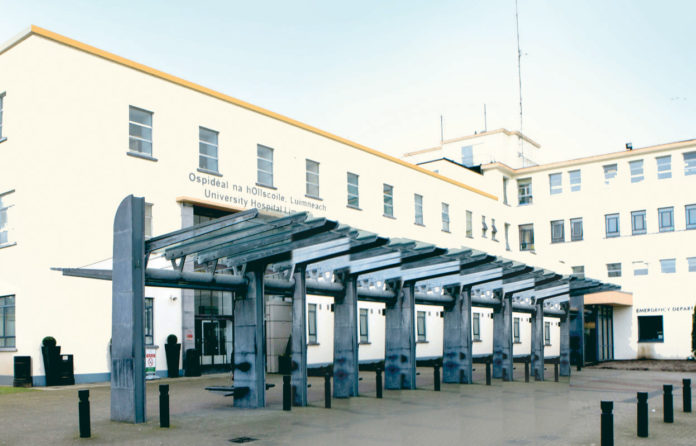The University Hospital Limerick (UHL) has enforced “an escalation of visiting restrictions” in order to “manage an outbreak of Covid-19 across four inpatient wards”, as it try’s to manage the highest number of covid patients and most patients on trolleys of any other hospital.
A UHL spokesman said that “as a precautionary measure, and following a meeting of the Hospital Crisis Management Team this Tuesday, visiting restrictions have now been extended to all inpatient wards” as well as at its Emergency Department, Acute Surgical Assessment Unit, and Acute Medical Assessment Unit.
The hospital’s bed capacity is also under strain, with only two general beds and one Intensive Care bed free, according to latest figures published by the HSE.
The hospital’s total bed capacity currently stands at 531, including 28 Critical Care beds, of which 12 are in the ICU (Intensive Care Unit) and 16 in the HDU (High Dependency Unit)
“We regret any inconvenience this ban on routine visiting causes for patients and their loved ones. Our outbreak control team is reviewing the situation daily and hospital management has decided it is now necessary to impose these measures in the interests of patient safety and keeping essential services open for all our patients,” said the hospital spokesman.
They added that “all appropriate infection control precautions are being followed to minimise the risk of spreading infection among staff and patients within our health facilities, and also within the wider community”.
There are exceptions to the visiting ban, which allows parents visiting their children, and people assisting vulnerable or “confused patients”, and “compassionate” visits, including patients “who are critically unwell or at end of life”.
“All these exemptions are limited to one person per patient only. In cases where these exemptions apply, we strongly recommend that members of the public are fully vaccinated against Covid-19 before visiting UHL to minimise any risks to our patients and to visitors themselves,” advised the spokesman.
They also appealed for people “not to visit their relatives/loved ones outdoors on the grounds of the hospital as this can also present a Covid-19 transmission risk”.
The hospital is also trying to manage “record volumes of patients attending its Emergency Department”, as well as 81 patients on trolleys and waiting for a bed in its overcrowded Emergency Department (46) and on wards (35).
UHL is also trying to cope with the highest number of Covid patients (42) in the country today, including six Covid patients in its Intensive Care Unit (ICU) / High Dependency Unit (HDU). It also has the highest number of suspected Covid cases (27) off any other hospital.
The hospital’s bed capacity is also under strain with only two general beds available, and only one Intensive Care bed free, according to figures published by the HSE.
A UHL spokesman said its total inpatient bed capacity currently stands at 531, including 28 critical care beds, of which 12 are in the ICU and 16 are in the HDU.
The UL Hospital’s Group has implemented additional ward rounds, is accelerating discharges, and is identifying patients for transfer to its regional Model 2 hospitals, and is reviewing scheduled care, in order to try to curb the spread of the virus in UHL.
It has also “opened surge capacity” in UHL, Ennis and Nenagh Hospitals to meet patient demand.
The spokesman urged the public to avoid the Limerick Emegerncy Department unless “you are seriously injured or ill or are worried your life is at risk”.
Regional injury units are open daily, in Ennis, Co Clare and Nenagh, Co Tipperary, from 8am-8pm, as well as at St John’s, Limerick, from 8am-7pm.
Noreen Spillane, Chief Operations Officer, UL Hospitals Group, acknowledged the current escalation in visiting restrictions was “difficult on patients”, but she added, “they are now necessary as we look to reduce footfall at UHL and reduce the risk of transmission of Covid-19”.
“We have the highest number of Covid-positive inpatients in the country at present and we continue to experience a surge in emergency presentations. Our focus is now on managing the current outbreak and protecting patient pathways for those who need emergency care as well as patients scheduled to come in for surgery, for diagnostic investigations and for outpatient appointments, many of whom have already faced delayed access to care due to the pandemic.”
“We are sorry to any of our patients experiencing long wait times for a bed at present,” Ms Spillane added.












